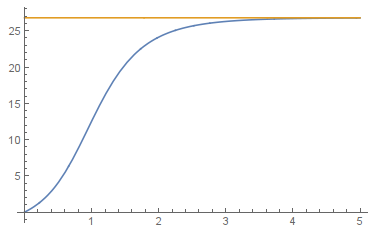Limit[ (Integrate[Sqrt[Exp[3 t + 2] + 3] , {t, 0, x}]^2) /
Integrate[Sqrt[Exp[6 t - 2] + 5] , {t, 0, x}] , x -> Infinity]
This can be solved but mathematica cant give a result. Why ?
Update: infinity limit
Assumptions -> x > 0 helps Mathematica to find these integrals
Limit[(Integrate[Sqrt[Exp[3 t + 2] + 3], {t, 0, x},
Assumptions -> x > 0]^2)/
Integrate[Sqrt[Exp[6 t - 2] + 5], {t, 0, x}, Assumptions -> x > 0],
x -> ∞]
(* (4 E^3)/3 *)
Validation
Plot[{(NIntegrate[Sqrt[Exp[3 t + 2] + 3], {t, 0, x}]^2)/
NIntegrate[Sqrt[Exp[6 t - 2] + 5], {t, 0, x}], (4 E^3)/3}, {x, 0, 5}, PlotRange -> All]

Assuming[x > 1000, Limit[Integrate[Sqrt[Exp[3 t + 2] + 3], {t, 0, x}]^2/ Integrate[Sqrt[Exp[6 t - 2] + 5], {t, 0, x}], x -> Infinity]]
$\endgroup$
Commented
Jan 13, 2015 at 15:03
There are lots of conditionals in there, that you need to carefully look at. Why not do this step by step so you see the issue?
Clear[x, t]
int1 = Integrate[Sqrt[Exp[3 t + 2] + 3], {t, 0, x}]
int2 = Integrate[Sqrt[Exp[6 t - 2] + 5], {t, 0, x}]

By passing them for now, we get
expr = (First@int1)^2/(First@int2)

Limit[expr, x -> 0]
(*0*)
(e^3x<=0).. makes me wonder why @algohli's answer works...
$\endgroup$
Commented
Jan 13, 2015 at 13:48
Integration in Mathematica treat every symbol as it can be any number (Real, Integer, Complex). Type of number defiantly change the results in some cases (as this one) and does not effect results in other cases.
In your case, the Integration depends on the value of x (combination of Imaginary and Real pares of x in case x is Complex)
If you want to get specific value for the integration without Conditions you either specify the rang of values of x that satisfy the result (using Assumptions or Assuming) or disable the ConditionalExpression using GenerateConditions -> False. as follows:
Limit[
(Integrate[Sqrt[Exp[3 t + 2] + 3], {t, 0, x}, GenerateConditions -> False])^2/
Integrate[Sqrt[Exp[6 t - 2] + 5], {t, 0, x}, GenerateConditions -> False],
x ->∞]
(4 E^3)/3